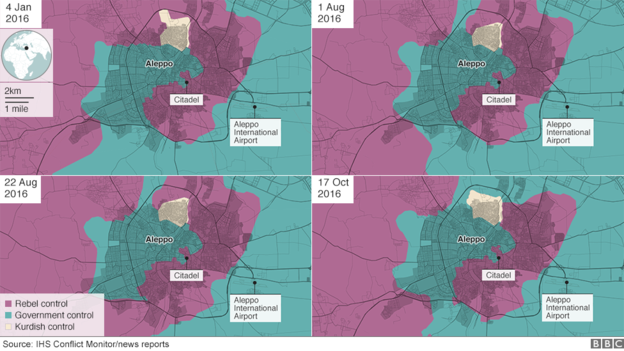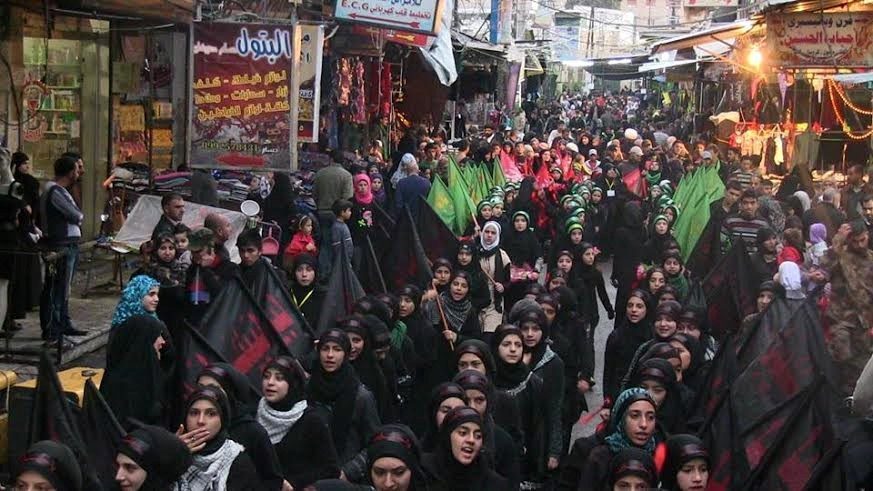
Assad regime and allied forces pushed harder on the ground and intensified airstrikes on rebel-held areas in eastern Aleppo, on the 20th of an offensive that has cost the rebels half of their stronghold and forced more than 30.000 out of their homes.
The Assad regime forces, backed by Russian air power, Iranian ground forces and Shi’ite militia fighters from Iran, Iraq, and Lebanon, has been tightening its grip on rebel-held districts of Aleppo this year.
They have gradually closed in on eastern Aleppo this year, first cutting the most direct lifeline to Turkey before fully encircling the east, and launching a major assault in September.
Rebel forces started a new military operation in October to break the siege, employing heavy shelling and suicide car bombs, was mainly focused on the city’s western edge by rebels based in the countryside outside Aleppo.
However, the rebels’ attack was repelled in many fronts by Assad regime’s forces and the battles have slowed down after the fourth day, as Assad regime deployed hundreds of fighters to the area and intensified its airstrikes.
Assad regime forces started a major offensive to push opposition fighters out of the besieged eastern half of the city on 15 November.
Helicopters continue extensively dropping barrel bombs in conjunction with airstrikes by warplanes on areas in the eastern neighborhoods of the city, accompanied by artillery shelling by the regime forces in the same places.
The regime’s forces’ persistent and the intensive airstrikes forced the rebels to leave the areas they hold.
In just over a week, the rebels have lost most of the northern neighborhoods in besieged east Aleppo.
Around 30.000 thousands of civilians left their homes fleeing the extreme bombardment and the clashes in the eastern parts of Aleppo in the last days, while voices around the globe have been calling for an end of this blood bath.
On Monday 28 November, government forces seized the Sakhur, Haydariya, and Sheikh Khodr districts, and Kurdish fighters took the Sheikh Fares neighborhood from rebels, marking the loss of third of the rebel-held areas since 4 years.
The clashes continued on Wednesday, as the regime forces pushed harder and the rebels vowed to defend the remaining areas.
The army and its allies said they had taken the Sheikh Saeed district in the south of the city on Wednesday. Rebels denied this, saying the government’s advance had been repelled. The Syrian Observatory for Human Rights, a British-based monitoring group, said the rebels retained a third of Sheikh Saeed.
Syrian Army take control Sheikh Sa'eed district,Sadcop Fuel Depot & last buildings in Ramouseh in south #Aleppo.
HD:https://t.co/ocvzbk1vZc pic.twitter.com/I9dA8NMJVS— Military Advisor (@miladvisor) November 30, 2016
On Sunday, Assad regime forces and their allies said they have advanced in Aleppo overnight seizing Tareq al-Bab, another neighborhood from rebels.
The UK-based Syrian Observatory for Human Rights said on Saturday that the capture of Tariq al-Bab means the government has now retaken the majority of the east of the city.
The regime has urged Aleppo’s rebel factions to accept a surrender under which they would abandon the city. In previous deals between the regime and rebels, they have been given safe passage to the opposition-held province of Idlib, while the civilians were forced to leave their homes too and leave to other areas. Opposition condemned these actions and said they were a part of a demographic change that the regime has always wished for.
an official with an Aleppo rebel group said commanders in the city had vowed to fight on. They would support the opening of corridors for civilians to leave the city, but would not surrender it.
“The military commanders in Aleppo said ‘we will not leave the city. There is no problem with corridors for civilians to leave, but we will not leave the city’,” Malahifji said.
“This is the decision of the factions. I spoke to them about everything that was tabled and they said they would not withdraw, and other things may also happen.”
The front lines around the rebel-held sector of Aleppo have mostly held steady since Monday, when rebels were forced from more than a third of the area they have controlled for several years in an assault by the Syrian army and its allies.
However, one Syria expert said that although the smaller area they occupied should make defending it easier for rebels, the cumulative impact of intense bombardment could force them to make a deal to withdraw, depending on the terms offered.
“The opposition’s ability to defend itself under this offensive is very much in question, and it’s easy to imagine that an eventual withdrawal seems increasingly likely,” an analyst said.
Dire situation for civilians
Around 30.000 thousands of civilians left their homes fleeing the extreme bombardment and the clashes in the eastern parts of Aleppo in the last days, while voices around the globe have been calling for an end of this blood bath.
Thousands of others preferred to move to other rebel-held parts of the city as reports said that regime forces were arresting the fleeing men.
U.N. envoy Staffan de Mistura said more than 100,000 people may still be in the rebel-held area. The Syrian Observatory for Human Rights, a Britain-based group that reports on the war, said it could be as many as 200,000 people.

Residents in eastern Aleppo also reported intense shelling in al-Sukkari neighborhood on the southern edge, where many of the newly displaced have sought refuge.
“The noose is tightening quickly,” Mohammed Abu Jaafar, a medical official in eastern Aleppo, told the Associated Press. “Our resources are also running low and beginning to disappear.”
Rescue workers in the rebel zone said renewed artillery bombardment had killed more than 45 people, mostly women and children who were fleeing the clashes, on Wednesday and injured dozens more.
More than 600 civilians were killed in the eastern parts since the offensive started.
de Mistura indicated eastern Aleppo could fall by the end of the year, saying “Aleppo is not going to stay that long”.
“I was feeling it would be a terrible battle ending up by Christmas/New Year. I hope the battle will not take place, that there will be some type of formula,” he said.
The UN’s humanitarian chief has warned that eastern Aleppo was being turned into “one giant graveyard”.
“For the sake of humanity, we call on, we plead, with the parties, and those with influence, to do everything in their power to protect civilians and enable access to the besieged part of eastern Aleppo before it becomes one giant graveyard,” O’Brien said.
“As we have seen before, across Syria and throughout the conflict, men, women and children, have been routinely arrested at government-controlled checkpoints, before being transferred to one of dozens of official or secret government-run detention facilities,” he said. “They are often held incommunicado and indefinitely, facing the risk of being subjected to torture and ill-treatment, extrajudicial killings or being disappeared.”
6yr old girl arrived to hospital alone after parachute bomb destroyed her home. Her family was under rubble. #Aleppo pic.twitter.com/Qqe9ChYKTd
— bint Abuonymous (@itsmenanice) December 3, 2016
45 Civilians killed early this morning by #Assad shells while they're trying to flee from East to West besiege #Aleppo @SyriaCivilDef pic.twitter.com/DcSSFUAES5
— Ahmad Alkhatib (@AhmadAlkhtiib) November 30, 2016
She survived, she run out from Death
It's not a ghost, She's a woman survived from death#Aleppo today pic.twitter.com/DX9lbxx2S2— Ahmad Alkhatib (@AhmadAlkhtiib) November 30, 2016
Capturing eastern Aleppo would be the biggest victory for Assad regime since the start of the revolution against him in 2011, restoring his control over the whole city apart from a Kurdish-held area that has not fought against him.
It would also be seen as a victory for his allies, Russia and Iran, which have outmaneuvered the West and Assad’s regional enemies through direct military intervention.
For Assad regime, taking back Aleppo would make its forces focus on ending the remaining rebels-held areas. These areas include the rebels’ stronghold in Idlib in addition to isolated areas in rural Damascus, Homs, and Hama.
These areas have been under daily bombardment and crippling siege for years. The Old city of Homs and parts of rural Damascus has already been lost to Assad regime, and the remaining areas are expected to follow.
As a conclusion, defeating the rebels and retrieving Aleppo means destroying the last major resistance stronghold of the Syrian rebels and will lead eventually to the victory of Assad regime and ending the Syrian revolution.




